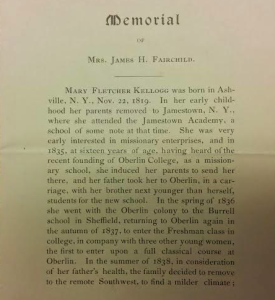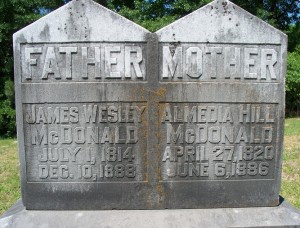Document 15:
Author: Mary Fletcher Kellogg
Recipient: James Harris Fairchild
Date: 8 February 1841
Location: Oberlin College Archives, James H. Fairchild Papers. Series III Courtship Correspondence,
1771-1926, RG 2/003.
Document Type: Transcript (1939) Autograph Letter, Signed by Author.
Introduction:

These last two letters in the collection were actually written on the same day, about three years into James and Mary’s correspondence, on 8 February 1841. At the time, Mary was still living in Minden, Louisiana, and James had just returned to Oberlin after his winter preaching in Palmyra, Michigan.
In Mary’s letter to James, she describes something of Southern life, and offers a different perspective on marriage and courtship. While Mary and James were courting primarily through letters with their parents’ blessing, others were not so lucky. In the following letter, Mary describes the elopement and marriage of her only friend from Minden, Almedia Hill. Hill had defied her parents’ wishes and married a man that they had specifically disapproved of, without their knowledge. Pay attention to Mary’s word choice as she describes the reaction to the elopement, and what that says about the severity of her friend’s defiant actions.

Source: “Almedia B Hill McDonald (1820 – 1886) – Find A Grave Memorial.”
In this letter, Mary also discusses a visit to a nearby plantation and her encounter with a young man there, who, in her words, attempted to provoke her for his own amusement by questioning whether or not James could love her with all the distance between them. The fact that Mary still seems to like the young man even after all his unkind words to her begs the question of what might have been the usual treatment of women in the South at this time.
Also of note is the fact that Mary explains to James that she told him of her acquaintances so that he might tell her if she were associating with the wrong people, or doing something that he felt was morally suspect. The fact that Mary viewed James as someone who could dictate to her what was and wasn’t acceptable drives home the fact that women in the mid-nineteenth century were still seen, even by themselves, as needing a man’s guidance in order to live their lives well.
Transcription:
Minden1, February 8, 1841.
My dear J., [sic]
I have received two letters of December date since last I wrote you. I am heartily glad you have resolved to write oftener. Be assured the pleasure I receive from the perusal of your letters is not diminished by their frequency.
Before this you have doubtless left Palmyra2 and perhaps are now resuming your classes in Oberlin. You have not met me there, a hope we have sometimes fondly cherished, and yet I do not regret that we have pursued the courses we have. It is better for me to be at home for the present and for you to have a fair trial of your capacities.
It has doubtless given you a confidence in yourself that will be highly advantageous whatsoever be your future destination. I will at least be satisfied with what I could not remedy.
We have today heard of the marriage of Miss Hill3 of whom I have often written you as my only friend.4 She has been spending 6 or 8 weeks in New Orleans. Her stepfather went for her and found her married the day before he got there. She did not see him at all. Her parents had previously opposed Mr. McDonald5 (the gentleman that was sick so long here last summer)6 and were not aware of an engagement and long correspondence between them. Her home is filled with mourning and desolation. She was an only child.
I would call upon the mother but am afraid my company would not be acceptable. She must suspect that I have been an accessory. James, you will not censure me for encouraging a friend to act in such a case contrary to the known wishes of her parents? She has long tried to please them till she has been convinced that her own taste and judgment can never go with theirs. She loves with an ardor that I have never before seen in anyone. Perhaps it is increased by the difficulties she has surmounted. Her parents are zealous and I might say bigoted Methodists. She is not a professor of religion. Poor girl, I pity her, and at the same time rejoice with her, for her husband is a paragon of excellence.
The young men of Minden wear their badges of mourning for Miss Almedia, Southern Romance. I<,> too<,> lament her loss for I am deprived of a valuable friend and associate. They will probably spend the summer in Minden, at least I hope they will. That will depend upon the reconciliation of the parents.
I have recently been from home on a visit at the home of a family named Jones. Spent 4 days, enjoyed myself very much. There is a charm and beauty connected with a plantation. Perhaps those of us who are deprived of country scenery feel it more sensibly than if we enjoyed it constantly. What rendered my visit, ride, etc. more agreeable was the company of a Mr. E<., _____> the most (and I might say the only) intelligent and agreeable young man in the place<,> from Kansas. For the first time<,> he quizzed me a little about you, giving me long lectures on the inconstancy of a man’s love. I replied that he was acquainted with only a Southern man’s heart. His object was not to affect my faith, I presume, but to elicit something from me<,> probably for his own amusement. I have learned to enjoy company<,> at the same time expecting that whatever word or action can be criticized or turned into ridicule will be improved. James, I sometimes mention some of my intercouse with others to you that you may form an opinion of the character of my associations and that you may, should you apprehend any danger to my principles, etc. make mention of it.
I have recently been reading Irving’s writings. I am pleased with them, particularly some of the Sketches<,>7 which are indeed beautiful…….. [sic]
You spoke of not being able to determine your future situation till you have consulted me. I would have you decide without the least reference to my judgment or opinion, for I have none whatever.
Present my warmest love to your Mother and sisters, and a kiss for little George.8
I remain yours truly,
MARY KELLOGG
Transcribed by Kasey Ulery.
1Minden, Louisiana, where Mary lived with her family after leaving Oberlin and before marrying James.
2Palmyra, Michigan, where James Fairchild spent a winter preaching after becoming ordained. He returned to Oberlin in the spring to complete his time at the Theological Seminary and graduate.
3Almedia Hill (1820-1886). She married James Wesley McDonald, with whom she had ten children. She is buried alongside her husband in the Minden City Cemetery (“Almedia B Hill McDonald (1820 – 1886) – Find A Grave Memorial,” web address, accessed 31 July 2015).
4In her letter of 11 May 1840, Mary describes a woman who was almost certainly Almedia Hill, saying: “There is but one young lady in the place whose society I would prize. She is of just my age, is an only child of wealthy parents<,> and has enjoyed all the advantages for education the Southern Country affords. She is not however, pious, though her parents are active members of the Methodist Church, yet respects religion. We have in each other seemed to find kindred spirits” (Oberlin College Archives, James H. Fairchild Papers. Series III Courtship Correspondence, 1771-1926, RG 2/003).
5 James Wesley McDonald (1814-1888) (“James Wesley McDonald (1814 – 1888) – Find A Grave Memorial,” web address, accessed 10 August 2015).
6In her 13 July 1840 letter to James, Mary described a gentleman who was probably McDonald, saying: “The sickly season<,> too<,> has seemed to come on before we were prepared for it or could have anticipated it. There has been a considerable number of cases of fever in the village and in the vicinity about, but no deaths as yet. For 18 days past<,> a young gentleman who boarded with us during the winter but has lately been upon the river, has been very sick indeed at our house with a fever, was attacked the night after he arrived, a very amiable and interesting young man. His life was for a long time d<e>spaired of<,> but he now seems to be very slowly recovering. Much anxiety has been felt for him by all<,> as he was universally beloved” (Oberlin College Archives, James H. Fairchild Papers. Series III Courtship Correspondence, 1771-1926, RG 2/003).
7Washington Irving was an early American author. The full title of the Sketches, which was a book comprised of thirty-four essays and short stories, was The Sketchbook of Geoffrey Crayon, Gent. (Geoffrey Crayon was a pseudonym used by Irving). It included some of Irving’s best-known works, including “Rip Van Winkle” and “The Legend of Sleepy Hollow,” and was one of the earliest American works widely read by a European audience.
8 James’ mother was Nancy Harris Fairchild. His sisters, who attended Oberlin College, were Catherine Baxter (later Mrs. Chester Cooley), Emily Frances (later Mrs. Miner Fairfield; she was also likely the first woman in the United States to receive an MA, which she earned in 1847), Mary Plumb (later Mrs. Cyrus Baldwin) and Harriet Eliza (later Mrs. Robert Kedzie). George Thompson was James’ youngest brother who later became President of Kansas State Agricultural College (Former Student File: President James Harris Fairchild. Record Group 28/2, Box 312. Oberlin College Archives).